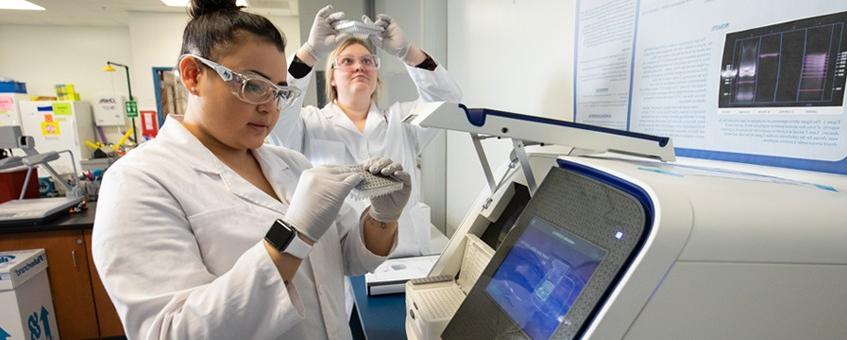
Biotechnology
Associate Degree Program
Biotechnology provides a career path for students with an interest in science and how things work. Biotechnology is the use of living organisms or biological systems to create or modify products or processes. Using yeast to make bread or beer is an application of biotechnology that dates back thousands of years. More modern examples include DNA fingerprinting, developing strains of pest-resistant crops, producing specialized medicines, and altering bacteria for industrial waste cleanup. In the biotechnology associate degree program, you will acquire a strong foundation of knowledge and skills that enables you to perform complex laboratory procedures and analyze data for research and testing purposes.
The curriculum includes four semesters of science, math, computer, and core courses.
Offered at the following campus(es): Stanton
What You Can Do
In this program, you will gain the knowledge and skills to prepare you for positions such as:
- A biotechnician for a variety of laboratory settings in the medical, environmental, industrial, and agricultural fields
What You Will Learn
Program Graduate Competencies
The Program Graduate Competencies listed below identify the major learning goals related to your specific program of study and identify the knowledge and skills you will have when you graduate to be successful in your chosen field.
- Apply knowledge of biology and chemistry to solve problems in biotechnology.
- Integrate biological knowledge with the regulatory, ethical and business perspectives relevant to the biotechnology industry.
- Apply quantitative and computational skills and tools to analyze problems in biology and chemistry.
- Demonstrate good laboratory practices that are required by a person working as a biotechnology technician including laboratory safety and documentation.
- Demonstrate laboratory skills relevant to biotechnology including recombinant DNA techniques, PCR, DNA sequence analysis, and current analytical chemistry techniques.
- Work independently and collaboratively to create scientific oral presentations and written documents that are standard to the discipline.
Core Curriculum Competencies
The Core Curriculum Competencies listed below identify what you will be able to do as a graduate, regardless of your program of study. You will acquire these core competencies through general education courses and program-specific coursework. You will be expected to use relevant technology to achieve these outcomes:
- Apply clear and effective communication skills.
- Use critical thinking to solve problems.
- Collaborate to achieve a common goal.
- Demonstrate professional and ethical conduct.
- Use information literacy for effective vocational and/or academic research.
- Apply quantitative reasoning and/or scientific inquiry to solve practical problems.
Suggested Pathway to Graduation
Semester 1
| Number | Course Title | Credits |
|---|---|---|
| SSC 100 | First Year Seminar | 1 |
| BIO 150 | Biology I | 4 |
| CHM 150 | Chemical Principles I | 5 |
| ENG 101 | Composition I | 3 |
| MAT 193 | Reasoning with Functions II | 4 |
Semester 2
| Number | Course Title | Credits |
|---|---|---|
| BIO 151 | Biology II | 4 |
| BIO 250 | Principles of Microbiology | 4 |
| CHM 151 | Chemical Principles II | 5 |
| ENG 102 | Composition II | 3 |
Semester 3
| Number | Course Title | Credits |
|---|---|---|
| BIO 262 | Genetics | 4 |
| CHM 250 | Analytical Chemistry I | 5 |
| Elective | Science Elective | 4/2 |
| Elective | Social Science Elective | 3 |
Semester 4
| Number | Course Title | Credits |
|---|---|---|
| BIO 263 | Molecular Biology | 4 |
| BIT 271 | Principles of Biotechnology | 4 |
| CHM 251 | Analytical Chemistry II | 4 |
| ENG 122 | Technical Writing and Communication | 3 |
| Elective | Social Science Elective | 3 |
Approved Electives
Select two (2) social science electives.
| Number | Course Title | Credits |
|---|---|---|
| COM 111 | Human Communications | 3 |
| ECO 111 | Macroeconomics | 3 |
| ECO 122 | Microeconomics | 3 |
| POL 111 | Political Science | 3 |
| PSY 121 | General Psychology | 3 |
| SOC 111 | Sociology | 3 |
| CLT 110 | Cross-Cultural Immersion | 3 |
Select one (1) science elective.
| Number | Course Title | Credits |
|---|---|---|
| BIT 270 | Cooperative Work Experience | 2 |
| SCI 223 | Applied Ecology | 3 |
| CHM 265 | Biochemistry | 4 |
| DAT 101 | Introduction to Data Analytics and Visualization | 3 |
| CHM 111 | Introduction to Organic and Biochemistry | 4 |
| SCI 130 | Introduction to Research | 2 |
| RES 150 | Independent Study and Research I | 1 |
| And | ||
| RES 200 | Independent Study and Research II | 1 |
| And | ||
| RES 250 | Independent Study and Research III | 1 |
To complete program requirements, you must pass the above courses and earn at least 65 credits. The number of courses and credits required for graduation may be more depending on college readiness and the elective courses offered in your program major (if electives are a part of the program).
BITAASBIT
This program is offered at the Stanton campus.
This program is offered at the Stanton campus.
Lakshmi Cyr
Department Chair, Instructor,
and Program Advisor
cpatton1@poscoop.com
(302) 454-3965
This program is offered at the Stanton campus.

